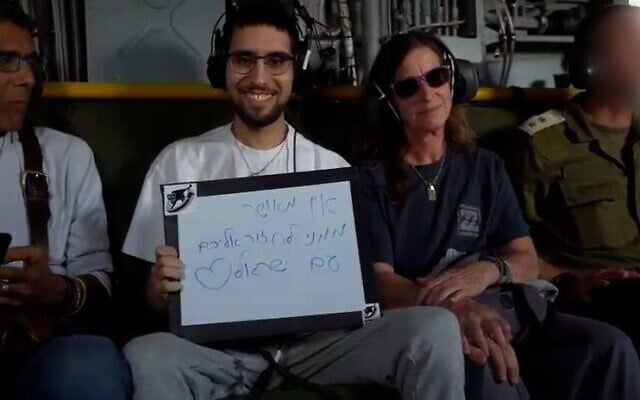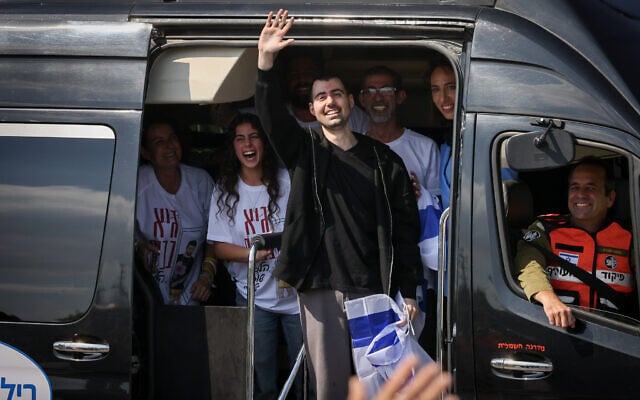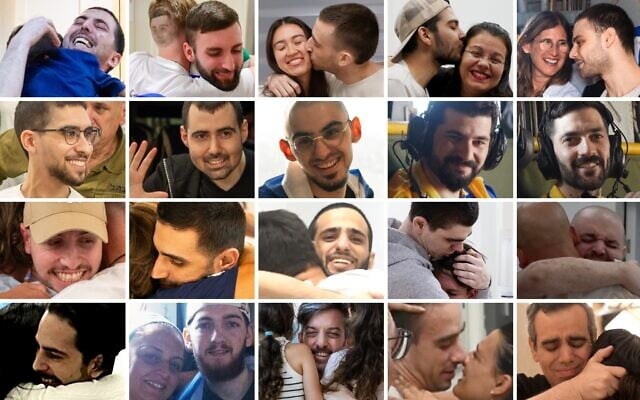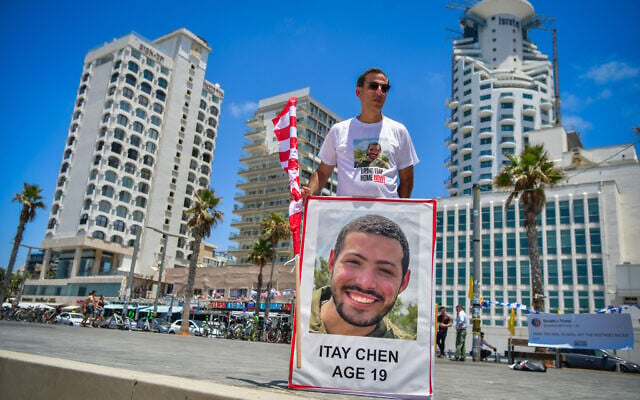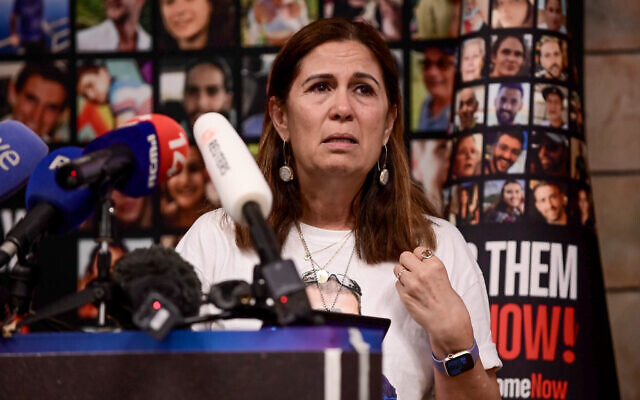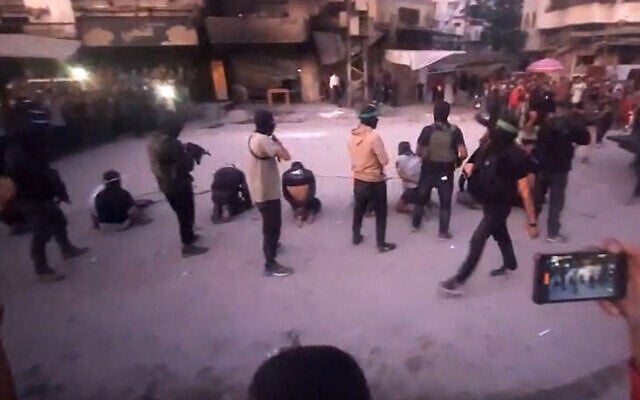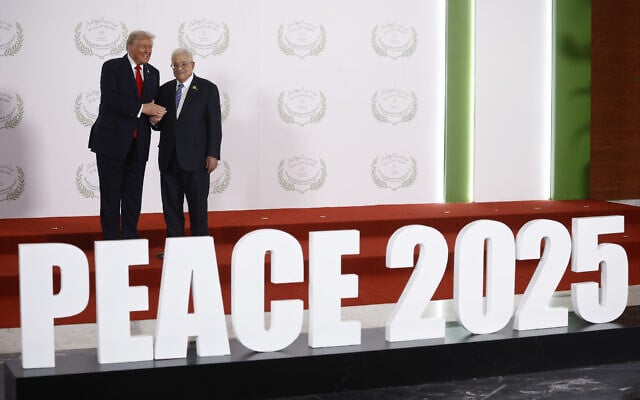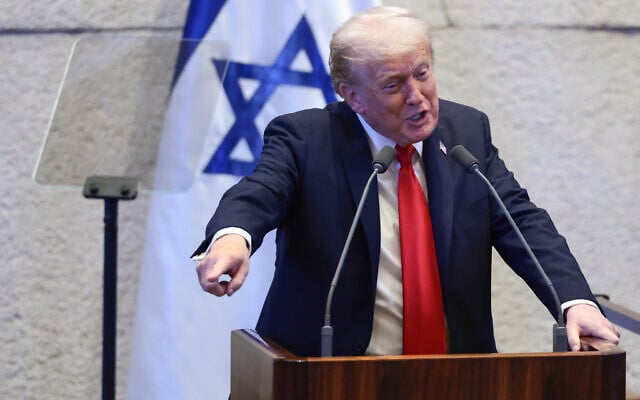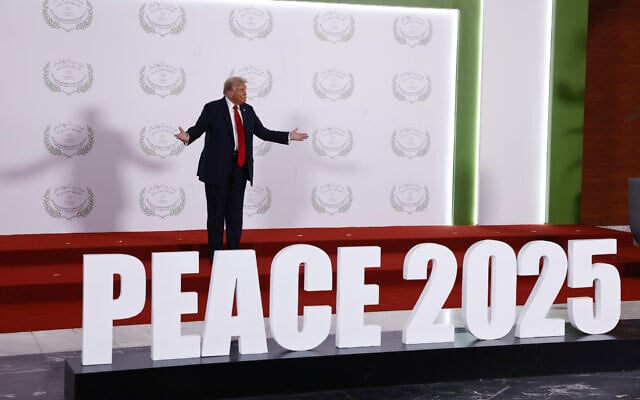

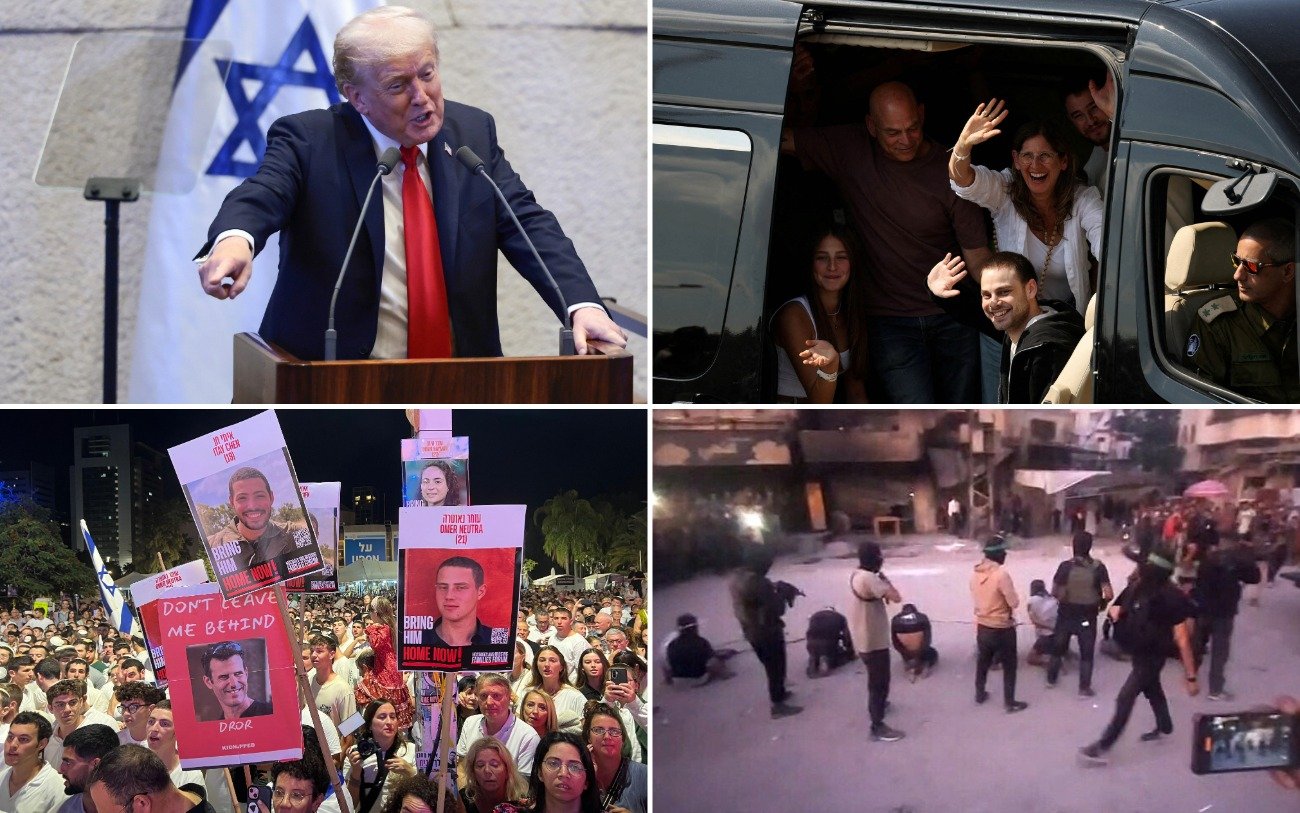
This Editor’s Note was sent out earlier Wednesday in ToI’s weekly update email to members of the Times of Israel Community. To receive these Editor’s Notes as they’re released, join the ToI Community here.
The war is not over, not for Israel or for Hamas, no matter how often the astounding US President Donald Trump announces that it is, or how many internally contradictory documents Israeli and Hamas negotiators solemnly affirm with their signatures. It is not over because Israel’s two declared and necessary goals for the war have not been fully achieved: many of the fallen hostages have not been returned, and Hamas has not been definitively prevented from rising again in Gaza.
And yet, Monday was the single most joyful day for Israel since the single worst day in its history precisely two years earlier. For the first time since Hamas burst into Israel in an orgy of murderous barbarism, a mass slaughter that it believed would lead to our destruction, for the first time since that blackest of days, there are now no living hostages held captive in the infernal depths of the Hamas Gaza terrorstate.
By sheer act of American presidential will, with the wary cooperation of Israel’s prime minister, 20 hostages came home to their families. Twenty worlds were saved.
The reunions were like nothing anybody had ever witnessed. Living souls had returned from the very edge of the abyss. Here they were, apparently normal people — walking, talking, embracing, smiling — after seven hundred and thirty-eight days in the hands of monsters.
In these first free moments, our returned hostages defied belief.
We last saw Evyatar David emaciated, required by his captors to dig what he was being told would be his own grave in a Gaza tunnel.
And now here he was, on an IDF helicopter, his mother at his side, calm and composed, writing on a white board: “There is nobody happier than me to return to you, people of Israel.”
David and his friend Guy Gilboa-Dalal were notoriously driven by their captors in a van to witness, near the stage, the February propaganda ceremony at which Omer Shem Tov, Eliya Cohen and Omer Wenker were released, and were filmed pleading for their lives and their freedom.
Now here was Guy, reuniting with his family at the Re’im military base, waving from a helicopter, greeting more relatives in the hospital — he, calm and smiling; they, overcome with emotion.
The Cunio brothers, David and Ariel, kidnapped along with since-returned loved ones, elected to reunite with family members by jumping out at them from behind a hospital wall! Who are these people?
As for those to whom they have returned, their joy and relief in those first reunited seconds emerged as anguished screams and squeals from deep inside their very souls. Tearful, breathless, painful elation. And hugs so tight you feared for the bones of their freed men.
These were redemption scenes. For those whose lives have been saved. For the families and loved ones to whom they have been restored. And, quite possibly, for our nation that, overwhelmingly if not universally, refused to relinquish them.
And what of those fallen hostages who have not yet come back?
What of their families — people like Ruby Chen, father of fallen hostage soldier Itay, who on Wednesday morning pleaded to the nation, “Don’t forget about us”; who asked Israelis to return to Hostages Square on Saturday night for yet another rally, because it turns out that last week’s, with those powerful speeches by Steve Witkoff and Jared Kushner, was not the final such gathering after all; who entreated us not to remove our yellow hostage pins, as the Knesset speaker did so ceremoniously during his interminable address before Trump’s on Monday afternoon?
What of these families of unreturned hostages, who share an unthinkable plight right now: waiting desperately for a call to definitively confirm the worst news they’ll ever receive?
Yael Adar, mother of Tamir, charged on Monday night that the government had betrayed her family and the others still consigned to the hellish limbo by failing to insist on terms that would compel Hamas to return all of the bodies it could possibly locate.
And somewhere between the initial, September 29, 20-point Trump peace plan for Gaza and the October 9 ceasefire-hostage agreement signed by Israel and Hamas in Sharm el-Sheikh, the ball was certainly dropped.
The September 29 document stated simply: “Within 72 hours of Israel publicly accepting this agreement, all hostages, alive and deceased, will be returned. Once all hostages are released, Israel will release 250 life sentence prisoners plus 1,700 Gazans who were detained after October 7, 2023, including all women and children detained in that context. For every Israeli hostage whose remains are released, Israel will release the remains of 15 deceased Gazans.”
But the October 9 deal, in one of its complex subclauses, gave Hamas leeway not to return all of the deceased hostages within those first 72 hours, and instead merely to transfer, in that period, “all the information it obtained relating to any remaining deceased hostages.”
It was widely recognized that Hamas would not be able to quickly locate and retrieve all of the remains of the dead. But the October 9 deal, as Adar highlighted, relinquished the leverage needed to ensure that Hamas would do its utmost to find and return them. Critically, Israel did not condition the releases of the terrorists and detainees on the return of all the deceased hostages Hamas could credibly send home — indeed, the 2,000 releases of prisoners went ahead as soon as the 20 living hostages were free and heading home on Monday, and even as it was becoming clear that Hamas planned to return only four bodies that day.
It had been expected that 7 to 15 of the 28 deceased would not be returned within the 72-hour deadline, but nobody had publicly voiced the notion that Hamas would send back as few as four.
To his further credit, Trump on Tuesday insisted that “the job is not done” since the hostages’ bodies “have not been returned as promised.” And he and Netanyahu have threatened violence against Hamas if this is not speedily rectified. Further bodies are now being returned. But, as Israel has conveyed via the deal mediators, Hamas knows exactly who it is able to return, and has manifestly been toying with Israel and the US.
As with Israel’s wrong-headed decision to suspend aid to Gaza between March and May to put pressure on Hamas, and right now with Trump’s unfathomable decision to temporarily allow Hamas to police Gaza, prompting a wave of summary executions and other killings, there is an abiding inability to fully internalize that Hamas is an Islamic extremist terrorist entity bent on eliminating Israel and killing Jews.
Trump determinedly interpreted Hamas’s conditional response to his 20 points as evidence that the terror group was now “ready for a LASTING peace,” ignored the caveats in the Hamas response, and mercifully, rightly, utilized it to secure the deal that saved those 20 lives.
But Hamas is not in fact remotely ready for a lasting settlement of any kind. It lives to kill.
We still don’t know exactly why Netanyahu chose not to accept Egyptian President Abdel-Fattah el-Sissi’s reluctant eleventh-hour invitation to participate in the Sharm el-Sheikh summit of world leaders on Monday evening.
It’s improbable that Turkey’s Israel-hating, Hamas-backing President Recep Tayyip Erdogan, reportedly circling over Egypt and refusing to land if Netanyahu was joining, would truly have headed home rather than share a conference hall with him. But if so, good riddance.
It’s also unlikely that Netanyahu’s presence at such an event on Simchat Torah, potentially involving breaking the festival, would have ignited an ultra-Orthodox-generated coalition crisis, as was suggested in some reports, since such a trip could rightly be understood as potentially saving many lives along the road.
It is quite possible, however, that the prime minister — abidingly overfearful of the incessant “we’ll leave” threats by his far-right coalition partners — was worried that his government would collapse if he was seen hobnobbing with another late invitee, Palestinian Authority President Mahmoud Abbas.
The official word from the Prime Minister’s Office was that the event was taking place too close to Simchat Torah — the resonant second anniversary in the Hebrew calendar of the Hamas slaughter.
But staying away was a missed opportunity. A missed opportunity that was less about Israeli input in the Gaza declaration agreed on and signed at the gathering, however well-intentioned a piece of paper it may be. Rather, it was a rare chance, passed up, to normalize Israel’s presence in the company of Arab and Muslim leaders with whom Israel wants to build relations.
Trump had barred Abbas from so much as entering the United States for last month’s UN General Assembly, requiring the PA chief to instead deliver his speech via video link. Yet there, in Sharm, Trump shared a photo op and a short, friendly conversation with the Palestinian leader — publicly restoring him to the fold, and signaling the PA’s involvement in shaping Gaza’s destiny. And here was Netanyahu, stuck at home, self-excluding Israel from that role among this dozens-strong group of regional and world leaders.
This US president is a force of nature.
He set his mind to getting the hostages out and on ending the war in Gaza, and he’s made unprecedented headway on both — pushing conflicting forces to align through sheer presidential will and vowing to relentlessly utilize the power of his office until they fully do so.
His address in the Knesset was extraordinary public evidence of his character, his efforts to rewrite history even as it unfolds, his humor, his unpredictability.
He proclaimed that “the world is loving Israel again,” even as demonstrations, boycotts, feckless Western governance and spiking antisemitism show it unarguably isn’t.
He decided that Iran is not restarting and will not restart its nuclear program, and that he knows better than the Iranian regime that it actually wants peace. “Even if they said, ‘We don’t wanna make a deal,’ I can tell you they wanna make a deal. All right? They do. They wanna make a deal. And we’re gonna see if we can do something,” he proclaimed. “There’s nothing that would do more good for this part of the world than for Iran’s leaders to renounce terror, stop threatening their neighbors, quit funding their militant proxies, and finally recognize Israel’s right to existence. They have to do that… And it’s gonna happen. ”
He stated that the Arab and Muslim leaders with whom he was about to meet in Egypt would become Israel’s partners and eventually friends, even as it had taken his personal intervention, earlier that day, to persuade Sissi to so much as invite Netanyahu to join, and as Indonesia’s president, getting cold feet, was backing away from a visit to Israel planned for the next day.
He managed to both upbraid Netanyahu for fighting on too long in Gaza and congratulate the prime minister for knowing it was time to stop, and for having the guts to end a war that Netanyahu has yet to declare is over.
Just read this extraordinary passage, some of it, I’d guess, from his prepared text, and some of it adlibbed:
I said to Bibi, “You know, the world is big, and it’s strong and… ultimately the world wins.” And we don’t have to worry about that now. But there was getting to be a period of time over the last few months, you know, the world wanted peace, and Israel wanted peace. Everybody did. Everybody did.
And what a victory it’s been, right? What a victory it’s been. If you would’ve gone on for three, four more years, keep fighting, fighting, fighting, it was, it was getting bad. It was getting heated. The timing of this is brilliant.
And I said, “Bibi, you’re gonna be remembered for this far more than if you kept this thing going, going, going; kill, kill, kill. It would not be the same.”
And I just want to congratulate you for having the courage to say, “That’s it. We’ve won and now let’s enjoy our lives, and let’s rebuild Israel, and make it stronger, and bigger and better than it’s ever been before. We’re gonna do that.” Took a lot of guts.
Which ToI, on the transcript of the president’s address, condensed into this headline: “You’ve won. You can’t beat the world. It’s time for peace.”
There’s no doubting the president’s insistent determination to forge a new Middle East — with Israel a normalized presence thriving safely within it. “I love Israel. I’m with you all the way,” he pledged, with potent succinctness, toward the end of his speech.
There’s no missing his specific focus on “peace” — which has become a forgotten, discredited word from another age, and one that he is now adamantly rehabilitating. It was invoked repeatedly by Witkoff and Kushner in Hostages Square on Saturday, and Trump used it more than 20 times in the Knesset.
But his stated vision — “New bonds of friendship, cooperation, and commerce will join Tel Aviv to Dubai, Haifa to Beirut, Jerusalem to Damascus, and from Israel to Egypt, from Saudi Arabia to Qatar, from India to Pakistan, from Indonesia to Iraq, from Syria to Bahrain, Turkey to Jordan, the United Arab Emirates to Oman, and Armenia to Azerbaijan” — cannot be achieved and maintained through presidential will and adroit dealmaking alone. It requires fundamental change in people’s thinking, tolerance for conflicting mindsets, the abandonment of terrorism, a region-wide recommitment to the sanctity of life.
And that has to start with education — where Trump’s indomitable will could most usefully focus: Require, as a condition for alliance with the world’s only superpower, the reform of education in nations, and UN bodies, that have for decades promoted intolerance, religious extremism and violence. Set the ball rolling by making clear to Qatar that it is not, in fact, a US ally so long as its Al Jazeera pumps brain poison into the homes of hundreds of millions of people.
“War is over, if you want it,” sang John and Yoko more than half a century ago. No, it doesn’t work like that.
Trump knows this. He saved 20 worlds on Monday. May that be only the start.



